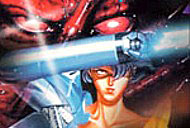
Bubblegum Crash
For fans of anime in the late 80s and early 90s, Bubblegum Crisis was the show to watch. A dark cyberpunk adventure featuring girls with guns and huge robots designed to kill, it was unavoidable for a very long time. Eventually, fandom moved on to newer and cooler shows, but Crisis still was many an American otaku's entrance into the world of anime.
However, the three-episode sequel known as Bubblegum Crash was treated like the ugly redheaded stepchild, a show that was neither loved nor respected. The typical claim was that they got the whole thing wrong. Many viewers (myself included) believed the naysayers and didn't bother to watch the show. But time and distance change a lot of things, so I went into Bubblegum Crash with a fresh outlook. And it helps, for although Crash doesn't reach the heights of the best episodes of the original series, it doesn't sink to its worst depths, either.
The world has changed for the better since the last adventure of the Knight Sabers nearly two years previous. Boomers are everywhere, but the androids are serving mankind, not rampaging through MegaTokyo. In fact, the members of the group aren't even sure if they are needed anymore, and a couple of them expect that they'll disband. Priss has gone on to score a chance at a recording deal, and Linna is making a fortune working for a brokerage. But then a mercenary group starts hitting banks with powered mecha, and the money they take is only a smokescreen--they're stealing industrial secrets behind a powerful AI that can make Boomers act and think humanly. The Knight Sabers are called back into action to stop this threat that will pit them against an unknown mastermind determined to bring down MegaTokyo for good.
Since Bubblegum Crash has been trashed for so long, I figure it's best to acknowledge the problems right up front. First, the animation is OK, not great but certainly functional. There are some repeated animation sequences that annoy me to no end, but these existed in the original series too. The budget for this thing just wasn't that huge. Second, the music that elevated the original in the eyes of its followers just doesn't hack it here. The first show had pop music, certainly, but it was rock pop with both melody and edge. This one's music just exists...it's not bad, but just window dressing.
What hurts the show most is that it sometimes feels like it exists in a parallel dimension to the original, instead of a direct follow-up. MegaTokyo is no longer the dark, brooding world that reminded us of William Gibson novels but rather a shiny city of the future not all that different from modern Tokyo. The girls are no longer bikers in truth or in attitude. Priss, for one, is completely different. She's subdued and mellowed. Can you imagine those as descriptors for that character? And though I promised not to compare the original voice actress to the substitute they got for this series, Ryoko Tachikawa is a terrible seiyuu for the character, with a gravelly voice that's downright painful to listen to. But beyond that, Priss is no longer a leader, a hothead, or even moody; she's not Priss from the original Crisis. This puts the show in the awkward situation of focusing on the other characters, primarily Nene and Sylia. It shifts the focus of the show radically away from the original's purposes. Ultimately, it's much more of a team show than Crisis, but with the downside that the team just doesn't feel like it used to. We also are treated to some goofy humor totally devoid of the atmosphere Crisis tried to create.
With those complaints--which are not minor--out of the way, I want to discuss what this show does right. First off, it's very clear that the show was written with the ending in mind all along. The plot keeps moving and keeps us interested all the way through, making each episode essential to the next. This is a welcome relief from Crisis, whose plots were usually unoriginal. It's amazing how many times they reused the same stories in only eight episodes! Whereas Crisis had a meandering, incomplete storyline, the three episodes of Crash tell a full, meaningful tale that ends the series effectively. If screenwriter Emu Arii had problems with making the characters feel right, he had no problem with creating a bang-up narrative that almost--and I stress almost--makes us forget the problems with atmosphere and setting the sequel has.
Just how important is the plot to the quality of the show? It's immense. I could forgive many of my issues because I finally felt that the story, which previously had been dragged out way too long, was going to be resolved. I enjoyed seeing the characters again, surprisingly enough. Though I didn't like what they'd done with Priss, she is actually more likeable here. It just takes getting used to. Once I could deal with the fact that this was not the same world as the original, that for all intents and purposes the characters had grown up, I could settle in and enjoy that it was solidly written and well paced.
Ultimately, I give Bubblegum Crash a B overall, the same rating I gave Bubblegum Crisis. This isn't to say that the best parts of Crisis aren't better than this show, because they are. But Crash never repeats itself, never gets even close to as bad as Crisis's worst episodes, and resolves the story effectively. If you loved the atmosphere of Crisis above the storylines, you'll hate Crash. But if you had wished as I did that Crisis had been more skillfully composed and can handle the changes between the two series, you'll find this a decent ending to the legendary show.
Bubblegum Crash -- violence, brief nudity, profanity -- B

